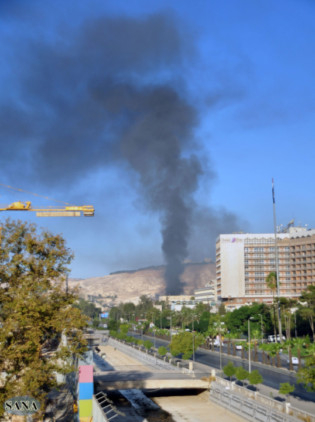
DAMASCUS: Two massive explosions targeting the army command headquarters rocked the heart of the Syrian capital yesterday, setting off clashes and a huge fire inside the building in the heavily guarded area, state-run media and residents said.
Information Minister Omran Zoubi said there were no casualties from the blasts, the latest to hit the city as the uprising against President Bashar Al Assad’s regime intensifies. But the explosions appear to show the deep reach of the rebels determined to topple the regime.
Witnesses said the explosions were followed by heavy gunfire, suggesting security forces clashed with gunmen in the area.
Syria’s state-run news agency, SANA, said the explosions struck just before 7 am (0400 GMT) near the landmark Omayyad square. The explosions were heard several miles (kilometers) away and shattered the windows of the Dama Rose hotel and other nearby buildings.
The army command building was in flames, sending huge columns of thick black smoke that hung over Damascus for several hours following the blasts.
“The explosions shook the entire apartment and the windows shattered,” said a resident of the nearby Abu Rummaneh district who spoke on condition of anonymity out of security concerns. “It was like a quake.”
Zoubi, the information minister, said the blasts were caused by two “large, highly explosive” improvised devices, one of which may have been placed “on the inner side of the fence” around the grounds of the army command building. He said the damage inflicted was material and there were no casualties.
“I can confirm that all our comrades in the military command and defence ministry are fine,” he told Syrian TV, which is located near the site of the explosion, in a telephone call.
“Everything is normal,” he said. “There was a terrorist act, perhaps near a significant location, yes, this is true, but they failed as usual to achieve their goals.”
Ambulances were rushed to the site as police sealed off the area to traffic and journalists. Traffic in other areas snarled as checkpoints were set up, blocking access to the capital from the suburbs.
Syria’s unrest began in March 2011 when protests calling for political change met a violent government crackdown. Many in the opposition have since taken up arms as the conflict morphed into a civil war that activists say has killed nearly 30,000 people. Over the past few months, the rebels have increasingly targeted security sites and symbols of regime power in a bid to turn the tide in the fighting.
On July 18, rebels penetrated the heart of Syria’s power elite, detonating a bomb inside a high-level crisis meeting in Damascus that killed three top regime officials, including Al Assad’s brother-in-law and the defence minister. Other large blasts have targeted the headquarters of security agencies in the capital, killing scores of people this year.
On Tuesday, several bombs went off inside a Damascus school that activists said was being used by regime forces as a security headquarters. Several people were wounded.
Syria’s conflict was the focus of attention as world leaders gathered at the UN General Assembly’s annual meeting in New York this week.
UN Secretary-General Ban Ki-moon demanded international action to stop the war in Syria, telling a somber gathering of world leaders Tuesday that the 18-month conflict had become “a regional calamity with global ramifications.”
Ban, declaring that the situation in Syria is getting worse every day, called the conflict a serious and growing threat to international peace and security that requires attention from the deeply divided UN Security Council.
That appears highly unlikely, however, at least in the near future.
Russia and China have vetoed three Western-backed resolutions aimed at pressuring Al Assad to end the violence and enter negotiations on a political transition, leaving the UN’s most powerful body paralyzsd in what some diplomats say is the worst crisis since the US-Soviet standoff during the Cold War.
In sharp contrast to the UN. chief, President Barack Obama pledged US support for Syrians trying to oust Al Assad — “a dictator who massacres his own people.












